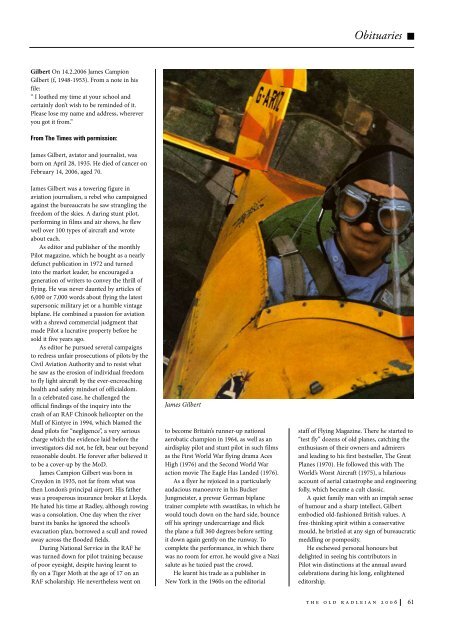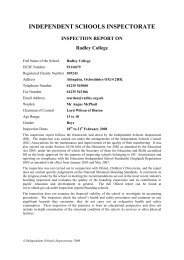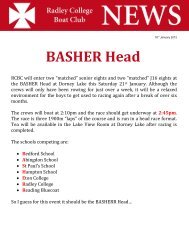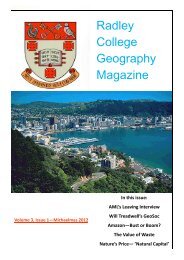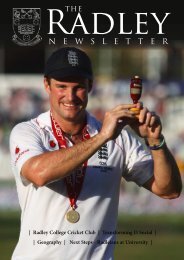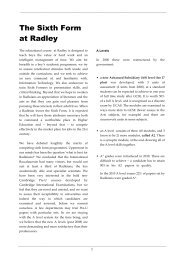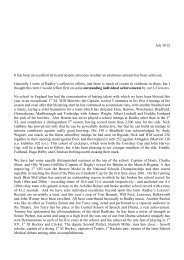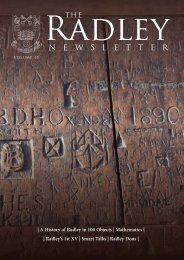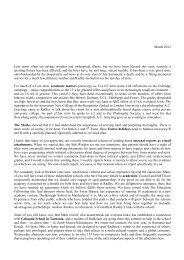Obituaries - Radley College
Obituaries - Radley College
Obituaries - Radley College
Create successful ePaper yourself
Turn your PDF publications into a flip-book with our unique Google optimized e-Paper software.
<strong>Obituaries</strong><br />
Gilbert On 14.2.2006 James Campion<br />
Gilbert (f, 1948-1953). From a note in his<br />
file:<br />
“ I loathed my time at your school and<br />
certainly don’t wish to be reminded of it.<br />
Please lose my name and address, wherever<br />
you got it from.”<br />
From The Times with permission:<br />
James Gilbert, aviator and journalist, was<br />
born on April 28, 1935. He died of cancer on<br />
February 14, 2006, aged 70.<br />
James Gilbert was a towering figure in<br />
aviation journalism, a rebel who campaigned<br />
against the bureaucrats he saw strangling the<br />
freedom of the skies. A daring stunt pilot,<br />
performing in films and air shows, he flew<br />
well over 100 types of aircraft and wrote<br />
about each.<br />
As editor and publisher of the monthly<br />
Pilot magazine, which he bought as a nearly<br />
defunct publication in 1972 and turned<br />
into the market leader, he encouraged a<br />
generation of writers to convey the thrill of<br />
flying. He was never daunted by articles of<br />
6,000 or 7,000 words about flying the latest<br />
supersonic military jet or a humble vintage<br />
biplane. He combined a passion for aviation<br />
with a shrewd commercial judgment that<br />
made Pilot a lucrative property before he<br />
sold it five years ago.<br />
As editor he pursued several campaigns<br />
to redress unfair prosecutions of pilots by the<br />
Civil Aviation Authority and to resist what<br />
he saw as the erosion of individual freedom<br />
to fly light aircraft by the ever-encroaching<br />
health and safety mindset of officialdom.<br />
In a celebrated case, he challenged the<br />
official findings of the inquiry into the<br />
crash of an RAF Chinook helicopter on the<br />
Mull of Kintyre in 1994, which blamed the<br />
dead pilots for “negligence”, a very serious<br />
charge which the evidence laid before the<br />
investigators did not, he felt, bear out beyond<br />
reasonable doubt. He forever after believed it<br />
to be a cover-up by the MoD.<br />
James Campion Gilbert was born in<br />
Croydon in 1935, not far from what was<br />
then London’s principal airport. His father<br />
was a prosperous insurance broker at Lloyds.<br />
He hated his time at <strong>Radley</strong>, although rowing<br />
was a consolation. One day when the river<br />
burst its banks he ignored the school’s<br />
evacuation plan, borrowed a scull and rowed<br />
away across the flooded fields.<br />
During National Service in the RAF he<br />
was turned down for pilot training because<br />
of poor eyesight, despite having learnt to<br />
fly on a Tiger Moth at the age of 17 on an<br />
RAF scholarship. He nevertheless went on<br />
James Gilbert<br />
to become Britain’s runner-up national<br />
aerobatic champion in 1964, as well as an<br />
airdisplay pilot and stunt pilot in such films<br />
as the First World War flying drama Aces<br />
High (1976) and the Second World War<br />
action movie The Eagle Has Landed (1976).<br />
As a flyer he rejoiced in a particularly<br />
audacious manoeuvre in his Bucker<br />
Jungmeister, a prewar German biplane<br />
trainer complete with swastikas, in which he<br />
would touch down on the hard side, bounce<br />
off his springy undercarriage and flick<br />
the plane a full 360 degrees before setting<br />
it down again gently on the runway. To<br />
complete the performance, in which there<br />
was no room for error, he would give a Nazi<br />
salute as he taxied past the crowd.<br />
He learnt his trade as a publisher in<br />
New York in the 1960s on the editorial<br />
staff of Flying Magazine. There he started to<br />
“test fly” dozens of old planes, catching the<br />
enthusiasm of their owners and admirers<br />
and leading to his first bestseller, The Great<br />
Planes (1970). He followed this with The<br />
World’s Worst Aircraft (1975), a hilarious<br />
account of aerial catastrophe and engineering<br />
folly, which became a cult classic.<br />
A quiet family man with an impish sense<br />
of humour and a sharp intellect, Gilbert<br />
embodied old-fashioned British values. A<br />
free-thinking spirit within a conservative<br />
mould, he bristled at any sign of bureaucratic<br />
meddling or pomposity.<br />
He eschewed personal honours but<br />
delighted in seeing his contributors in<br />
Pilot win distinctions at the annual award<br />
celebrations during his long, enlightened<br />
editorship.<br />
t h e o l d r a d l e i a n 2 0 0 6<br />
61


